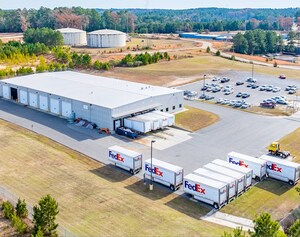LOS ANGELES, May 2, 2024 /PRNewswire/ -- Cove Capital Investments today released the following article by Dwight Kay, Founding Partner and Managing Member, Cove Capital Investments:
Article Summary:
Delaware Statutory Trusts (DSTs) offer several potential advantages for real estate investors, including tax benefits, hands free ownership opportunities, access to high-quality properties, and the ability to potentially generate monthly income via ACH direct deposit. These DST pros make DSTs an appealing option for investors looking to expand their real estate portfolios with no management responsibilities or headaches.
However, DSTs also come with some cons, such illiquidity and other inherent risks associated with real estate investing. Understanding both the pros and cons of DSTs is crucial for investors considering this 1031 exchange investment vehicle for their portfolios.
Key Takeaways:
- How do DSTs provide investors tax advantages?
- What is hands free ownership, and why do many investors like this about DSTs?
- What advantages does "beneficial ownership" provide DST investors?
- What are the responsibilities of the trustee in a DST structure?
- What are some of the risks associated with DST investments and real estate investing?
Serious real estate investors consistently seek ways to maximize returns and minimize tax burdens. The Delaware Statutory Trust (DST) 1031 Exchange strategy is one innovative investment vehicle that provides numerous benefits to real estate investors, from deferring capital gains taxes to providing passive income and access to large commercial and multifamily investment properties.
Delaware Statutory Trust Potential Pros
Tax Advantages
Imagine selling a property, making a substantial profit, and not losing a significant portion to the government through capital gains taxes. Delaware Statutory Trusts can make this a reality. By reinvesting your sale proceeds into a Delaware Statutory Trust with the help of a Qualified Intermediary, and within the timeframe outlined in IRS Code Section 1031, investors can defer capital gains taxes in order to redeploy capital into additional real estate investment options.
Hands Free Investing, Active Returns
Beyond tax deferral benefits, DSTs epitomize hands free ownership. Investors can eliminate the hassles of active real estate management and enjoy the freedom of having a professional real estate trustee (the Delaware Statutory Trust sponsor company) handle 100% of the property management responsibilities. This means no more of the terrible 3 T's: toilets, tenants, and trash. In this way, DSTs help investors create more free time to focus on what matters in life while your real estate generates potential monthly income for you via ACH direct deposit.
Access Larger Real Estate Assets
DSTs often invest in large, commercial-grade and multifamily properties that would be typically financially out of reach for most individual investors. By pooling resources of other DST investors through the "beneficial ownership structure" of Delaware Statutory Trusts, investors have the potential to access large, quality real estate assets.
Beneficial Ownership: Diversified Risk and Rewards
DSTs allow you to purchase beneficial ownership interests in a variety of real estate assets such as multifamily properties, industrial distribution centers, and net lease buildings. This beneficial ownership structure allows investors the potential to diversify DST holdings across multiple asset classes, geographic regions, and DST sponsor firms*.
*Diversification does not guarantee returns and does not protect against loss.
Professional Management of Real Estate Assets:
Delaware Statutory Trusts (DSTs) utilize professional real estate management companies (DST sponsors like Cove Capital Investments) to oversee and maintain properties within the DST trust. These management professionals are responsible for tasks such as property maintenance, tenant relations, rent collection, financial reporting, and strategic planning. In this way, DSTs allow investors to step away from the active management headaches and the day-to-day challenges associated with "Tenants, Toilets, and Trash."
Potential Risks of Delaware Statutory Trusts
In addition to the pros, the Delaware Statutory Trust also has some potential cons as well. Therefore, it is essential that investors be aware of the potential risks of DSTs before investing in one.
Delaware Statutory Trusts (DSTs) are a popular legal ownership structure for holding title to real estate assets. There are many benefits of the DST structure that make it a popular investor strategy for many real estate investors.
Illiquidity:
One of the greatest potential risks of DSTs involve the illiquid nature of them. After all, DST 1031 properties are real estate, and like all other types of real estate, they are inherently illiquid. In addition, because DSTs are made up of a beneficial ownership structure, investors should be able and willing to hold their investment in a DST 1031 property for the full life of the program, which could last for 4 to 7 years or even longer.
Property-Specific Risks:
DST 1031 properties are real estate and contain the same risks that all other forms of real estate entail. All forms of real estate investing, whether buying rental homes, duplexes, apartment buildings or commercial properties are speculative and involve a high-degree of risk. They are considered speculative because there are no guarantees with real estate investing. Delaware Statutory Trust 1031 properties, similar to all other types of real estate an investor may own on their own, are subject to the risks of increased and ongoing vacancy, tenant bankruptcies, problematic tenants, economic downturns, physical damage, and unexpected maintenance issues.
It's essential for investors to thoroughly research and understand the risks associated with investing in DSTs, and to consult with financial and legal professionals who can provide guidance tailored to their individual circumstances and risk tolerance.
Delaware Statutory Trust: A Potentially Potent Investment Tool
While Delaware Statutory Trusts (DSTs) offer investors a powerful tool to augment their real estate strategies, this real estate investment strategy may not suit every investor's needs. DSTs have the potential to offer investors an array of benefits, including tax advantages, hands free ownership, access to higher quality properties, and diversification. However, it is equally important for investors to read each DST offerings Private Placement Memorandum (PPM) which will provide a full overview of the business plan and risk factors of the investment, because afterall, Delaware Statutory Trust investments, like real estate you would own on your own, do contain risk.
About Cove Capital Investments
Cove Capital Investments is a DST sponsor company providing accredited investors access to 1031 exchange eligible Delaware Statutory Trust properties as well as other real estate investment offerings. The Cove Capital team consists of Acquisitions, Asset Management, Accounting, In-House Counsel, Investor Relations, Marketing and Capital Markets. Cove Capital maintains a robust current inventory of DST and private equity real estate offerings potentially available to investors. Cove Capital Investments has sponsored more than 1.9 million square feet of 1031 DST and real estate offerings in the multifamily, net lease, industrial and office sectors.
For further information, please visit www.covecapitalinvestments.com or contact Cove Capital at (877) 899-1315 and via email at [email protected].
*Past performance is no guarantee of future results. *Diversification does not guarantee returns and does not protect against loss. *Preferred return is not guaranteed and is subject to available cash flow.
This material does not constitute an offer to sell nor a solicitation of an offer to buy any security. Such offers can be made only by the confidential Private Placement Memorandum (the "Memorandum"). Please read the entire Memorandum paying special attention to the risk section prior investing. IRC Section 1031, IRC Section 1033 and IRC Section 721 are complex tax codes therefore you should consult your tax or legal professional for details regarding your situation. There are material risks associated with investing in real estate securities including illiquidity, vacancies, general market conditions and competition, lack of operating history, interest rate risks, general risks of owning/operating commercial and multifamily properties, financing risks, potential adverse tax consequences, general economic risks, development risks and long hold periods. There is a risk of loss of the entire investment principal. Past performance is not a guarantee of future results. Potential cash flow, potential returns and potential appreciation are not guaranteed. By visiting the covecapitalinvestments.com site, other affiliated portals, or corresponding on pages here within, you are opting for communications on behalf of Cove Capital Investments, or its affiliated companies. Securities offered through FNEX Capital, member FINRA, SIPC.
SOURCE Cove Capital Investments

WANT YOUR COMPANY'S NEWS FEATURED ON PRNEWSWIRE.COM?
Newsrooms &
Influencers
Digital Media
Outlets
Journalists
Opted In




Share this article